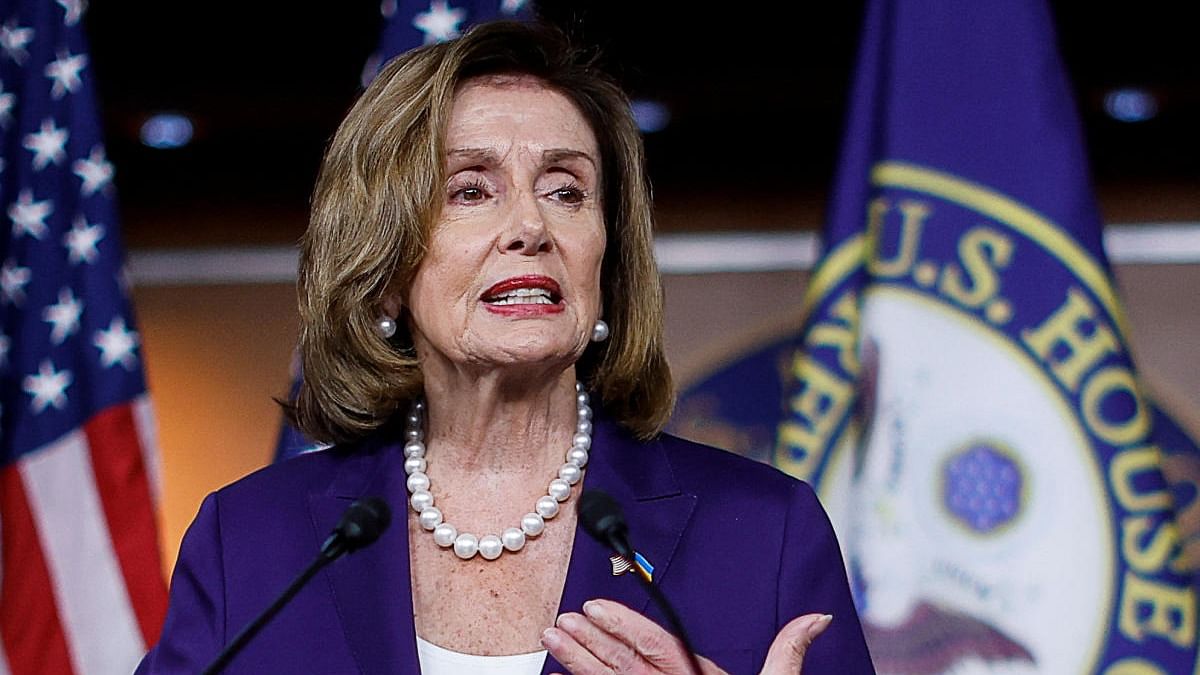
The United States will "pay the price" if House Speaker Nancy Pelosi visits Taiwan during her Asia trip, China warned Tuesday, as tensions between the two superpowers continued to soar.
The prospect of Pelosi going to Taipei, which would be the highest-profile visit by a US official in 25 years, has triggered increasingly bellicose warnings from Beijing that have set the region on edge.
Pelosi has yet to officially confirm if she will land in Taiwan as part of an ongoing Asia tour but US and Taiwanese media have reported it will happen.
"The US side will bear the responsibility and pay the price for undermining China's sovereign security interests," foreign ministry spokeswoman Hua Chunying said at a regular press briefing in Beijing.
China considers self-ruled, democratic Taiwan as its territory and has vowed to one day seize the island, by force if necessary.
It tries to keep Taiwan isolated on the world stage and opposes countries having official exchanges with Taipei.
In a call with US President Joe Biden last week, Chinese President Xi Jinping warned the United States against "playing with fire" on Taiwan.
While the Biden administration is understood to be opposed to a Taiwan stop, White House National Security Council spokesman John Kirby said Pelosi was entitled to go where she pleased.
"The speaker has the right to visit Taiwan," he told reporters on Monday. "There is no reason for Beijing to turn a potential visit consistent with longstanding US policies into some sort of crisis."
The last House Speaker to visit Taiwan was Newt Gingrich in 1997.
Kirby cited intelligence that China was preparing possible military provocations.
He said Pelosi was travelling on a military aircraft and that while Washington did not fear a direct attack, it "raises the stakes of a miscalculation".
Kirby reiterated, however, that US policy was unchanged toward Taiwan.
This means support for its self-ruling government, while diplomatically recognising Beijing over Taipei and opposing a formal independence declaration by Taiwan or a forceful takeover by China.
Meanwhile, Russia on Tuesday backed its ally China on the issue, accusing Washington of "bringing destabilisation to the world".
China has refused to condemn Russia's invasion of Ukraine and has been accused of providing diplomatic cover for the Kremlin by blasting Western sanctions and arms sales to Kyiv.
Pelosi arrived in Kuala Lumpur on Tuesday where she met Malaysian Prime Minister Ismail Sabri and Foreign Minister Saifuddin Abdullah.
AFP journalists saw Pelosi coming out of a hotel in the Malaysian capital and entering an SUV. Her motorcade then departed under heavy security.
Press access around Pelosi has been tightly restricted so far and limited to a handful or short statements confirming meetings with Malaysian and Singaporean officials.
Her itinerary includes stops in South Korea and Japan -- but the prospect of a Taiwan trip has dominated attention.
Taipei has remained silent on the prospect of a Pelosi visit.
Multiple Taiwanese media outlets carried comments from deputy parliament speaker Tsai Chi-chang saying Pelosi was "very likely" to visit in the coming days.
And the Liberty Times newspaper cited unnamed sources as saying she would land Tuesday night, then meet President Tsai Ing-wen the next day before departing in the afternoon.
Taiwan's 23 million people have long lived with the possibility of an invasion, but that threat has intensified under Xi, China's most assertive ruler in a generation.
The island's military on Tuesday said it was "determined" to defend it against increased threats by China over the potential Pelosi visit.
"The probability of war or a serious incident is low," tweeted Bonnie Glaser, director of the Asia programme at the US-based German Marshall Fund think tank.
"But the probability that... (China) will take a series of military, economic, and diplomatic actions to show strength & resolve is not insignificant," she added.
"Likely it will seek to punish Taiwan in myriad ways."
Pelosi's potential visit has been proceeded by a flurry of military activity across the region that highlights how combustible the issue of Taiwan is.
Last week Taiwan completed its largest annual wargames, which included simulations intercepting Chinese attacks from the sea.
China then conducted live fire drills on Saturday in the Taiwan Strait.
The US has maintained a navy presence in the region, including the usually Japan-based aircraft carrier USS Ronald Reagan which sailed through the South China Sea last week.
The Seventh Fleet's official Twitter reported Tuesday that the aircraft carrier was now in the Philippine Sea.